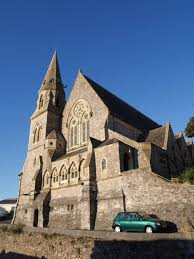
The Reverend Edwin Emmanuel Bradford (1860-1944) was a clergyman, poet and novelist. Edwin was born in Torquay where his family owned a jeweller’s shop on the Strand, and baptised along with some of his sisters at St Luke’s in Warren Road.
He was educated at Castle College School in Torquay and at Exeter College, Oxford University. He graduated in 1884 with third-class honours in Theology, proceeded to a Masters in 1901, and achieved a Bachelor of Divinity in 1904 and a Doctor of Divinity in 1912.
After ordination in the Church of England in 1884, Edwin served curacies at High Ongar and Walthamstow in Essex. He went to St Petersburg as assistant chaplain to the English Church in 1887-1889 and then to Paris where he was an assistant curate in 1890-1899.
Back in England Edwin was given two more curacies, at Upwell and Eton. In 1907 he wrote a traditional religious tract called ‘Sermon sketches for the Sundays of the Christian year’. He got a parish of his own in 1909 and remained as vicar of Nordelph, Norfolk, until his death.
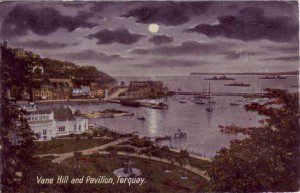 So far, Edwin appears quite a modest and traditional clergyman. However, he was also part of an informal group of English ‘Uranian’ poets and he produced copious amounts of homoerotic poetry. His prose was very popular during his lifetime, with WH Auden and John Betjeman being admirers.
So far, Edwin appears quite a modest and traditional clergyman. However, he was also part of an informal group of English ‘Uranian’ poets and he produced copious amounts of homoerotic poetry. His prose was very popular during his lifetime, with WH Auden and John Betjeman being admirers.
Many of his poems are directed towards young males, who go by the names of Willie, Eric, Dick, Guy, Frank, Jock, Aubrey and Silvester. The very titles of these works give away the predilections of their author. They include: ‘Passing the Love of Women’; ‘Boyhood’; ‘In Quest of Love’; ‘Lays of Life and Love’. Others are indicative of both the content and style of the poems: ‘I Saw Will Home One Windy Night’, ‘The Chorister’, `The Bather in the Blue Grotto at Capri’, `Mother’s Boy’, ‘When First I Fell in Love with You’, and ‘Take It, Lad, Or Leave It’. Here we read of a young Irish boy: “O Paddy Maloy is a broth of a boy, As pretty as pretty can be; He tosses his curls in disdain at the girls, For not one is as pretty as he.”
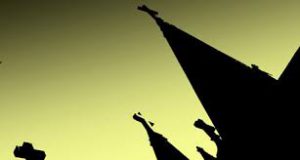 In a poem for children, Edwin describes ‘Our Jack’ who, though a manly young chap is much more attractive than any girl. In ‘The Woodman’s Boy’ it only takes a kiss from a tanned young man for Edwin to declare, “I have done with maidens timid and pale; He has made me in love with all things male. So it’s hey for a life in the forest, Hard toil and manly joy! I want no wife to smooth my life, No friend but the woodman’s boy.”
In a poem for children, Edwin describes ‘Our Jack’ who, though a manly young chap is much more attractive than any girl. In ‘The Woodman’s Boy’ it only takes a kiss from a tanned young man for Edwin to declare, “I have done with maidens timid and pale; He has made me in love with all things male. So it’s hey for a life in the forest, Hard toil and manly joy! I want no wife to smooth my life, No friend but the woodman’s boy.”
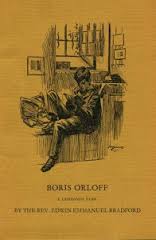 Here’s a couple of other examples:
Here’s a couple of other examples:
“Hilary is seventeen
Hopeful, though his home’s an attic,
Optimistic and serene,
Though his future’s problematic:
Full of love is he I ween –
So all say, and so I see, too:
What remains still to be seen
Is – has he love to spare for me, too?”
… or how about:
“O Willie, Willie, Willie, summer holidays are coming,
And I know that you are coming with the holidays, too:
And Love, little chum, beats a heart like a drum,
Rat-a-tat! rat-a-tat! rat-a-tat! tum! tum!
In a sort of merry devilish tattoo.”
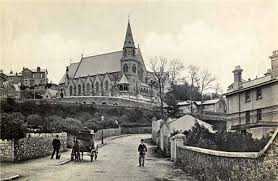 Edwin saw many of his young male friends die in both world wars and wrote this condemnation of war:
Edwin saw many of his young male friends die in both world wars and wrote this condemnation of war:
“So some men counsel: ‘Breed and multiply!’
The most prolific race at last will win.
Send forth your sons in myriads to die
Or kill their fellows. Till next war begin,
Breed on with fury; pour your children in
Till every shop and factory be full,
And labour cheap. What if they’re starved and thin?
— I have no heart to procreate
Earth children for the sword:
The Love that links me to my mate,
Himself is his reward.”
The gay subtext in much of Edwin’s work seems pretty obvious to us in these less innocent days of the early twenty first century. Yet, the newspapers of the time didn’t seem to raise an eyebrow. Neither, it appears, did any of Edwin’s parishioners, his fellow clergy, or his Bishop ever notice what this prolific local vicar was writing. It may be that the Church just didn’t want to know. Indeed, there’s still a lack of recognition of Equal Marriage in Britain even today with some Christian traditions being deeply homophobic.
Edwin is now recognised as a leading gay poet of the early 20th century.
For more local news and info, go to our home page or you can join us over on Facebook or Twitter.



























